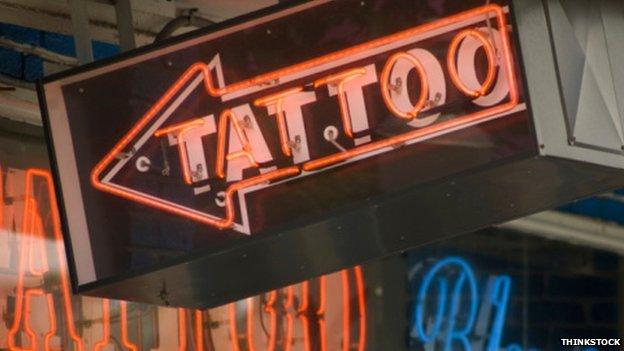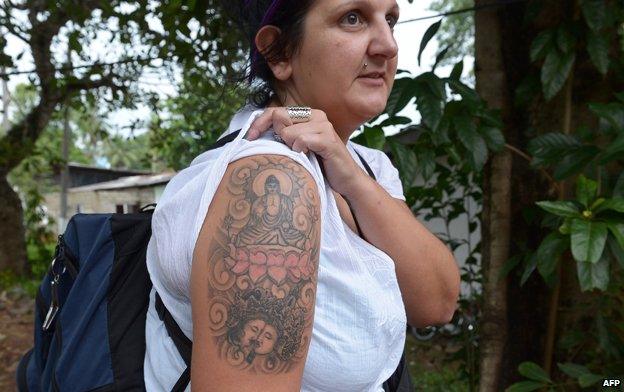The ways tattoos can get you into trouble
- Published

The Sri Lankan authorities have ordered the deportation of a British tourist because she had a Buddha tattoo on her arm. Here are some other ways tattoos can get you into trouble, writes Vanessa Barford.
The authorities in Sri Lanka are tough on perceived insults to Buddhism, the religion of the island's majority Sinhalese, and particularly sensitive about images of Buddha. In March, another tourist was denied entry because officials said he had spoken "disrespectfully" about a similar tattoo. He insisted he followed Buddhist teachings and thought a tattoo was an apt tribute.
Thailand has threatened to crack down on tourists having religious images tattooed on their bodies while on holiday, saying the trend is culturally inappropriate, external and erodes respect for religion. Tattoos have also caused problems in Malaysia. In 2012, the country cancelled a concert by US singer Erykah Badu after a publicity photo showed her with the "Allah" in Arabic tattooed on her upper body, saying it was "an insult to Islam".

British tourist Naomi Coleman's tattoo shows a Buddha sitting on a lotus flower
However, Japan is the country that stands out, according to Dr Matt Lodder, art historian and tattoo expert at the University of Essex. "There's a relatively recent - 20th Century - association of tattoos with criminal gangs, and they are often banned in places like public bath houses. I know a woman in her 30s who was also turned away from a hotel," he says. The anti-inkwork sentiment is stronger is some parts of Japan than others. In 2012, the Mayor of Osaka surveyed all of his 30,000 employees for tattoos, external, saying that those that wanted to keep them should find jobs elsewhere. "Other places like Tokyo have a vibrant tattoo culture," Lodder adds.
It's not just religious sensitivities or cultural values at play. In October 2012, the head of the Metropolitan Police in the UK forbade police officers and staff from getting visible tattoos because they "damaged the professional image" of the force. The US Army has also just released a new rulebook on tattoos, external. In addition to banning extremist, indecent, sexist and racist tattoos, soldiers are now prohibited from having tattoos on their head, face, neck, wrists, hands and fingers. Sleeve tattoos are banned below the elbow and knee, with the number of visible tattoos - which must be smaller than the size of the wearer's hand - limited to four.
Follow @BBCNewsMagazine, external on Twitter and on Facebook, external